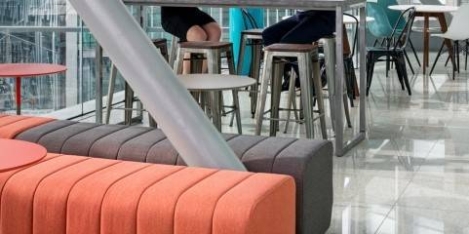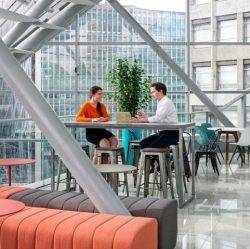October 16, 2017
Third of employees complain employers do not offer any wellbeing programmes
 Over half of employees would choose a company that cared about their wellbeing, over one that pays 10 percent more, a new survey claims. According to the research by Reward Gateway, over 22 million British workers, or seven in 10 employees (71 percent), have felt stress or financial strain in the last five years, however, a third of workers said their company currently offered no programmes and just 29 percent of respondents said that their company currently offers a physical programme. The findings also suggest a disparity of opinion between employee and employer. While over half (51 percent) of employers agree that their company shows they care about employees mental, physical and financial wellbeing, only 14 percent of employees say that their company couldn’t do more to show they care. But employers too would benefit from taking a more proactive approach to wellbeing, as more than half (52 percent) of UK employees agree that they would choose a company that cared about their wellbeing over one that pays more.
Over half of employees would choose a company that cared about their wellbeing, over one that pays 10 percent more, a new survey claims. According to the research by Reward Gateway, over 22 million British workers, or seven in 10 employees (71 percent), have felt stress or financial strain in the last five years, however, a third of workers said their company currently offered no programmes and just 29 percent of respondents said that their company currently offers a physical programme. The findings also suggest a disparity of opinion between employee and employer. While over half (51 percent) of employers agree that their company shows they care about employees mental, physical and financial wellbeing, only 14 percent of employees say that their company couldn’t do more to show they care. But employers too would benefit from taking a more proactive approach to wellbeing, as more than half (52 percent) of UK employees agree that they would choose a company that cared about their wellbeing over one that pays more.













 The majority (94 percent) of workers are open to flexible ways of working such as part-time, freelance, contract, temporary or independent contract work a new report from ManpowerGroup has revealed. Coining the trend as NextGen work, the research suggests this approach to a job is a choice (81 percent) not a last resort (19 percent). Findings from #GigResponsibly: The Rise of NextGen Work – a global survey of 9,500 people in 12 countries – identifies a shift towards this new way of getting work done, and that it works for people and employers. People were asked how they want to work, what motivates them and their views on NextGen Work. More control over their schedule (42 percent), boosting their bank account (41 percent) and developing new skills (38 percent) are top reasons why this flexible kind of work is on the rise. The report also found that this flexible approach is not just attractive to Millennials, as meaningful work and employer appreciation are valued more by Boomers than any other generation. More than 80 percent of US workers say NextGen Work is a choice, not a last resort, and builds resilience for less predictable futures.
The majority (94 percent) of workers are open to flexible ways of working such as part-time, freelance, contract, temporary or independent contract work a new report from ManpowerGroup has revealed. Coining the trend as NextGen work, the research suggests this approach to a job is a choice (81 percent) not a last resort (19 percent). Findings from #GigResponsibly: The Rise of NextGen Work – a global survey of 9,500 people in 12 countries – identifies a shift towards this new way of getting work done, and that it works for people and employers. People were asked how they want to work, what motivates them and their views on NextGen Work. More control over their schedule (42 percent), boosting their bank account (41 percent) and developing new skills (38 percent) are top reasons why this flexible kind of work is on the rise. The report also found that this flexible approach is not just attractive to Millennials, as meaningful work and employer appreciation are valued more by Boomers than any other generation. More than 80 percent of US workers say NextGen Work is a choice, not a last resort, and builds resilience for less predictable futures.







 UK workers are largely optimistic about the impact automation will have in the workplace, with three in four believing it will give them more time to concentrate on their primary job duties and work more flexibly, claims new research. Workfront’s annual State of Enterprise Work report, which aims to capture not only how work is being done and what challenges office workers see in the present, but also how they see current workplace trends playing out in the near future reveals that 84 percent agreed with the sentiment that “the use of automation in the workplace will let us think of work in new and innovative ways.” 82 percent expressed excitement at the chance “to learn new things as the workforce moves toward more automation;” and while the overwhelming view on automation was positive, around 2 in 5 (38 percent) feared that rising automation will place humans and robots in competition for the same jobs in the future.
UK workers are largely optimistic about the impact automation will have in the workplace, with three in four believing it will give them more time to concentrate on their primary job duties and work more flexibly, claims new research. Workfront’s annual State of Enterprise Work report, which aims to capture not only how work is being done and what challenges office workers see in the present, but also how they see current workplace trends playing out in the near future reveals that 84 percent agreed with the sentiment that “the use of automation in the workplace will let us think of work in new and innovative ways.” 82 percent expressed excitement at the chance “to learn new things as the workforce moves toward more automation;” and while the overwhelming view on automation was positive, around 2 in 5 (38 percent) feared that rising automation will place humans and robots in competition for the same jobs in the future.








